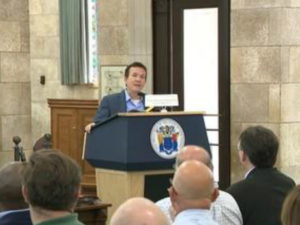 by David Cruz, Senior Correspondent of NJTV News
by David Cruz, Senior Correspondent of NJTV News
Please view the video here.
Back in the early days of the Christie administration, the Republican governor unveiled a tool kit intended to give municipalities a way to control property taxes. Included in that kit was a 2% cap on public employee salary increases, salary arbitration awards and on local tax increases. The new governor allowed the salaries and arbitration award limits to expire last year, though. The 2% limits on local tax increases, however, was permanent, and that has created the potential for budget imbalances, which brought together a hearing room full of municipal financial officers to figure out what the new landscape will look like for negotiations with public employee unions.
“Caps are really an insult to good county and local elected officials. If you’re doing your job, you don’t need a cap,” said keynoter Sen. Declan O’Scanlon. “They also punish folks that have run their governments efficiently before a cap is inflicted on you. If you’ve got a lot of fat in your budget and you were doing a crappy job, a cap doesn’t hurt you all that much. You can go years because you’ve got a lot of fat left in your budget. If you’ve been responsible at the time we place a cap on you, sorry, you’re being punished for your previous responsibility.”
The problem, according to this room full of the management side of labor relations, is that without the caps on salaries and arbitration awards, the unions will be emboldened, confident that their demands will more likely be met by an arbitrator than by municipal management.
“One of the topics that came up was about asking for substantial increases — as a matter of fact, going to the table and demanding substantial increases, and going to the table prepared by scrubbing municipal budgets, by looking for where there is money that is available so that it’s not necessarily burdening the taxpayers, but going in and demanding money from your budgets and from your balance sheets from places like reserves that have been built over time,” said the Town of Harrison’s CFO Gabriela Simoes Dos Santos.
The real wild card in labor relations going forward is the elimination of Chapter 78, which increased the amount union workers have to pay toward their health coverage. That number is now open to negotiation on the local level, much to the consternation of local management.
“We cannot predict. If I go to the CFO and say I settled a contract at 3% inclusive of increment, can you cost that out for the next three years, he can cost that out. He can budget for it; he can understand it,” explained Giacobbe. “But if I say ‘John, I just reduced the chapter 78 top tier from 35 to 26%, cost that out,’ how do you cost that out? You don’t know where health benefits are going to go. Every year they go up 10%, sometimes they go up zero. The next year they go up 20%.”
It won’t come as a shock to anyone, but the police union — the PBA — says that management is less interested in good labor relations and more interested in eliminating benefits and requiring more from workers.
“We’ve made such changes in our health benefits system and made so many concessions — not just chapter 78 payments, not that we’re paying a third as law enforcement — but just the lower level of benefit that our members are taking day to day,” countered New Jersey Police Benevolent Association Health Benefits Administrator Kevin Lyons.
In the end, all this stuff — interest arbitration caps, salaries, who wins, who loses –matters to you. Because, come tax time, the person who foots the bill for all this is you.
On a side note,
here is the Contracts presentation provided by Town of Harrison’s CFO Gabriela Dos Santos as well as Various Financial Analyst and
Contract Cost Out With Budgetary Impact presented by Borough of Wharton’s CFO Jon Rheinhardt.
 by David Cruz, Senior Correspondent of NJTV News
by David Cruz, Senior Correspondent of NJTV News